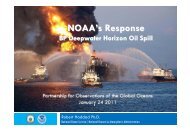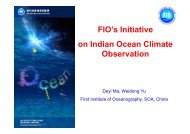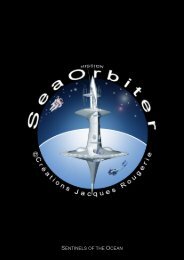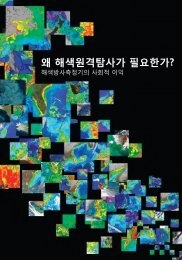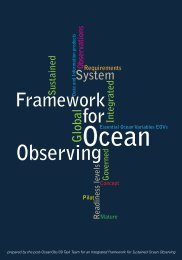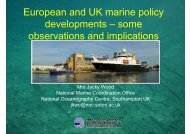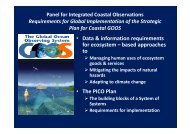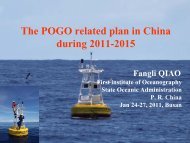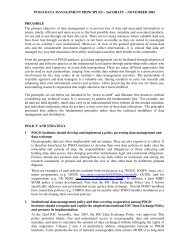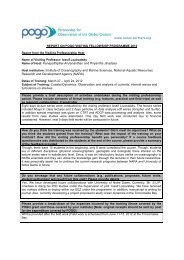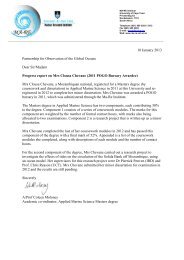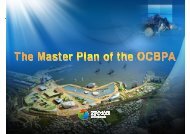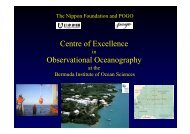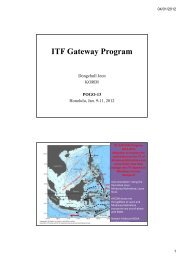NF-POGO Centre of Excellence Year 2 Report
NF-POGO Centre of Excellence Year 2 Report
NF-POGO Centre of Excellence Year 2 Report
- No tags were found...
You also want an ePaper? Increase the reach of your titles
YUMPU automatically turns print PDFs into web optimized ePapers that Google loves.
programs in marine and ocean sciences. Notably missing from this US-based program is thechance to understand oceanographic and marine issues on a global scale, especially as seen byyoung students from developing countries. Since all year 2 <strong>NF</strong>-<strong>POGO</strong> Scholars have advanceddegrees (or were enrolled in a graduate program), there were many lessons that could be sharedbetween the (very) young students involved in the NSF-REU Program and the young <strong>NF</strong>-<strong>POGO</strong>Scholars. Two workshops were held, with students exchanging information about their homestate/territory (for NSF-REU Students) or their home country (for <strong>NF</strong>-<strong>POGO</strong> Scholars). Eachpresentation was followed by questions/answers. The workshops were each scheduled for 2 hr,but each lasted 3 – 4 hr due to the lengthy discussions that followed each presentation. Theworkshop schedule was:October 26 2009November 6 2009<strong>NF</strong>-<strong>POGO</strong> Presentations to REU StudentsREU Presentations to <strong>POGO</strong> Scholars2.7 <strong>NF</strong>-<strong>POGO</strong> Scholars – Independent ProjectsEach <strong>NF</strong>-<strong>POGO</strong> Scholar was given the opportunity to design and execute an independent projectwhile at BIOS. We introduced this concept to Scholars when they first arrived in Bermuda inAugust. BIOS faculty provided topic areas and specific titles for research projects, but allowedthe students to modify/adjust what they wanted to do within the confines <strong>of</strong> available equipmentand expertise. Scholars had several opportunities during the Fall semester and again over theChristmas/New <strong>Year</strong> holiday to work on their projects, whether the work involved experimentalmanipulations and/or background reading. We planned for all Scholars to have a projectoutlined by mid December and to begin full-time research in mid March. This allowed 10 weeksfor independent study.Scholars were required to write a proposal for their project. Proposals were evaluated by theScholars‟ mentors based on: 1) basic skills (i.e., writing skills); and 2) academics/scientificcriteria (e.g., quality and/or novelty <strong>of</strong> the idea; clarity <strong>of</strong> presentation; strength <strong>of</strong> hypothesis;strength <strong>of</strong> experimental approach).Scholars were allowed to work on their projects based on self prescribed time lines andschedules. The Scholar projects and mentors are outlined in the following table:<strong>NF</strong>-<strong>POGO</strong>ScholarKentaro SuzukiHui ChaoLilian KrugPriyaWadanahalugeHoang Cong Tin<strong>NF</strong>-<strong>POGO</strong> Scholar Project Titles and MentorsProject TitleOligotrophic jelly-plankton blooms: implications forcarbon cycling in the Sargasso SeaSeasonal and inter-annual Pattern <strong>of</strong>Coccolithophore pigment and ocean acidificationOcean-atmosphere CO2 flux in North AtlanticOceanVariability <strong>of</strong> phytoplankton with relation to C fluxat BATS sitePrimary production in the spring bloom in theSargasso Sea: An integration <strong>of</strong> time-series in-situdata and ocean color remote sensing observationsMentorsDr. RobertCondonRobDr. AndreasAnderssonDr. AndreasAnderssonDr. Michael LomasDr. Michael Lomas10



